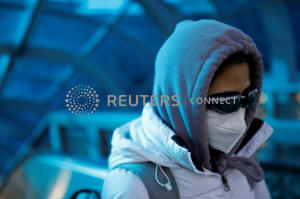China virus deaths rise to 170 as hit to global economy looms
 Send a link to a friend
Send a link to a friend
 [January 30, 2020]
By Muyu Xu and Cate Cadell [January 30, 2020]
By Muyu Xu and Cate Cadell
BEIJING (Reuters) - Hundreds of foreign
evacuees from the Chinese city of Wuhan entered quarantine on Thursday
as deaths from a fast-spreading virus rose to 170 and markets shuddered
at the impact of an inevitable big hit to the world's No. 2 economy.
All eyes were on the World Health Organization (WHO), which has held off
declaring the flu-like coronavirus a global emergency but was to
reconsider that later in the day.
Such a declaration would trigger tighter containment and
information-sharing guidelines, but may disappoint Beijing, which had
expressed confidence in defeating the "devil" virus.
It could also potentially spook markets further.
"The fear is that they (the WHO) might raise the alarm bells ... so
people are taking money off the table," said Chris Weston, head of
research at Melbourne brokerage Pepperstone.
The day after a state economist forecast the crisis would lop a
percentage point off China's first quarter growth, global stocks
tumbled, the yuan hit its lowest this year, oil prices slid again and
safe haven assets like gold gained.

The coronavirus, which originated in an illegal wildlife market in the
central city of Wuhan, has now claimed 170 lives and infected 7,711
people in China, latest official data showed.
Almost all the deaths have been in Hubei province - of which Wuhan is
the capital - where 60 million people are now living under virtual
lockdown, staying inside their homes and only venturing out with masks
on.
"Canteens are not open. Most of the shops are closed. We cannot go out
and buy food," Si Thu Tun, one of 60 students from Myanmar trapped in
Wuhan, told online news outlet the Democratic Voice of Burma.
"Honestly, I have one big potato and three packs of instant noodles and
some rice," he said. Myanmar plans a special flight to get the students
out within three days.
GLOBAL SPREAD
As other countries fly citizens out, cut flights and corporate travel,
and heighten screening, another 105 cases have emerged in at least 16
places from Japan to the United States.
An Italian cruise ship's 6,000 passengers were kept on board while tests
were held on two Chinese travelers suspected of having the coronavirus.
The crisis has stoked a wave of anti-China sentiment around the globe,
from shops barring Chinese tourists to online mockery and surprise
checks on foreign workers.
Australia, South Korea, Singapore, New Zealand and Indonesia were
quarantining evacuees for at least two weeks, though the United States
and Japan planned shorter, voluntary isolation.
Three Japanese, from 206 evacuated on Wednesday, were infected, and
worryingly two of them had not shown symptoms, Tokyo said. A second
Japanese flight included nine people showing fever or coughing symptoms,
broadcaster NHK said.

India was the latest nation to report a case, a student of Wuhan
University. And South Koreans protested at facilities earmarked as
quarantine centers, throwing eggs at a minister.
"The weapons that will protect us from the new coronavirus are not fear
and aversion, but trust and cooperation," said South Korean President
Moon Jae-in as Seoul prepared to evacuate the first of about 700
citizens from Wuhan.
[to top of second column]
|

A woman wearing a face mask and goggles uses an escalator near
Beijing Railway Station as the country is hit by an outbreak of the
new coronavirus, in Beijing, China January 30, 2020. REUTERS/Carlos
Garcia Rawlins

In the corporate world, Alphabet Inc's Google and Sweden's IKEA were
the latest big names to close China operations. Samsung Electronics
said it had extended holiday closure for some Chinese production
facilities.
Airlines to suspend flights to China include British Airways,
Lufthansa, Air Canada and American Airlines. Air France cabin crew
unions were demanding the same, sources said, though the company has
already allowed pilots and crew to opt out of China flights.
"WHEN CHINA SLOWS, WE FEEL IT"
Fuelling concern over the damage to productivity, thousands of
Chinese factory workers on Lunar New Year holidays may struggle to
get back to work next week, due to extensive travel restrictions
imposed to stop the spread of the virus.
Global policymakers are anxious, with China taking center stage at
U.S. Federal Reserve Chair Jerome Powell's news conference on
Wednesday.
"China's economy is very important in the global economy now, and
when China's economy slows down we do feel that - not as much though
as countries that are near China, or that trade more actively with
China, like some of the Western European countries," he said.
Streets in many Chinese cities were largely deserted and tourist
attractions shut. Starbucks coffee shops were requiring temperature
checks and masks.
Cases of human-to-human transmission outside China are of particular
concern to medics, but it is too early to determine how lethal the
coronavirus is, as there are likely to be many cases of milder
infections going undetected.
It has an incubation time of between one and 14 days.

Chinese National Health Commission Minister Ma Xiaowei said this
week the virus was infectious during incubation, unlike Severe Acute
Respiratory Syndrome (SARS), another virus that emerged from China
and killed about 800 people in 2002 and 2003.
The global cost from SARS was estimated at $33 billion, or 0.1% of
world GDP in 2003.
Many economists fear the impact on global growth could be bigger
this time than from SARS as China now accounts for a larger share of
the world economy.
(Reporting by Pei Li, Gabriel Crossley, Cate Cadell and Muyu Xu in
Beijing; Samuel Shen and David Stanway in Shanghai; Josh Smith,
Sangmi Cha and Joyce Lee in Seoul, Chang-Ran Kim in Tokyo and Se
Young Lee; Stephanie Nebehay in Geneva; Kate Kelland in London;
Crispian Balmer in Rome; Thu Thu Aung in Yangon; Writing by Robert
Birsel and Andrew Cawthorne; Editing by Clarence Fernandez and Nick
Macfie)
[© 2020 Thomson Reuters. All rights
reserved.] Copyright 2020 Reuters. All rights reserved. This material may not be published,
broadcast, rewritten or redistributed.
Thompson Reuters is solely responsible for this content. |